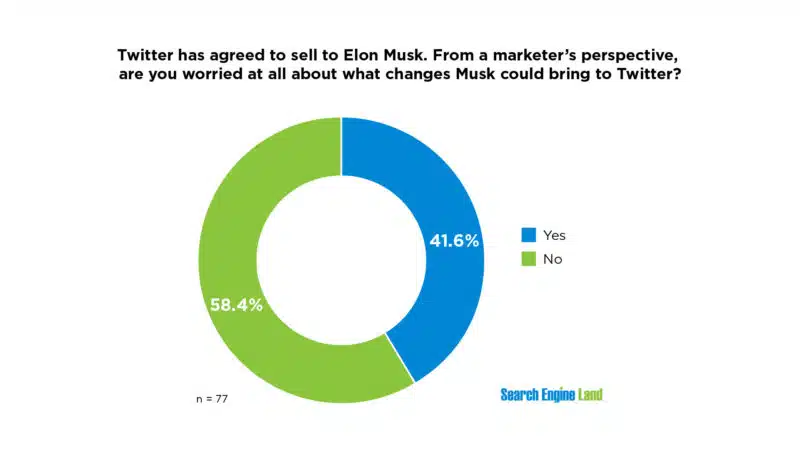Elon Musk taking over Twitter, but most marketers not worried
Despite concerns about "free" speech, 58% of marketers we polled think Musk owning Twitter will be good for brands, marketers and users.

It’s the end of Twitter as we know it. And a majority of marketers feel fine.
One week ago, Elon Musk acquired Twitter for $44 billion. And if his tweets hold any truth, he has big changes in mind, such as an edit button, long-form tweets and defeating the spambots.
So how are marketers excited, worried or meh about it all? We polled our audience to find out.
Why 58% of marketers aren’t concerned. Verification of accounts. Removing bots. Free speech. These were among the reasons marketers are feeling optimistic about Musk owning Twitter. Here’s a sampling of comments:
- “I hope to see the option to let all users Verify their account (if they want to). It would be good to let all users have the option to view only Verified Accounts Tweets.”
- “Elon will bring people back to Twitter and remove bots, sounds like a great opportunity for advertising.”
- “I think a politically neutral approach to content moderation will broaden the user base and make more audiences reachable on the platform. Making the algorithm open source should make the factors that affect marketing success more transparent and testable. I also think the commitment to removing bots and spammers will make it a place that more people want to spend their time. This is great news.”
- “Everything Musk touches turns to gold (PayPal, Tesla, SpaceX). I’m not worried. If he can get the rampant bots/spam under control, it will be a boon to users and marketers alike! Higher signal to noise ratio would help ad CTR and other metrics, I’d think.”
- “Allowing for the free and open exchange of information and ideas does not bear any negative weight for brands. In fact, brands should celebrate this.”
- “Twitter ads have never worked great for us, so any change feels like a good change.”
For what it’s worth: former Twitter CEO Jack Dorsey tweeted in support of Musk’s vision of Twitter (“having a public platform that is maximally trusted and broadly inclusive is extremely important to the future of civilization.”)
Why 42% of marketers are concerned. Brand safety. Less users. And “free speech” (which many believe is code for “hate speech”). These were among the reasons marketers are feeling not so great about Musk owning Twitter. Here’s a sampling of comments:
- “If Twitter becomes increasingly known as a mainly political motivated environment populated by ‘alternative truths’ (aka lies), ultra-radical outpourings and dubious conspiracy theories, then I can see a risk of brands getting caught up in the maelstrom and have difficulty maintaining authority and brand integrity, Or, simply losing their voice in the general noise.”
- “As a marketer, I’d be worried, not because I dislike the idea of Elon Musk owning Twitter, or that he might make Twitter more moderate on how it handles speech on the platform, I’d be worried simply because change is always worrisome, especially one that is as big as the one he seems to be aiming for.”
- “I’m concerned that the ban on bots makes industry tools harder to manage – but more significantly that Elon’s statements about ‘absolute free speech’ mean that hate speech will be allowed to proliferate even more. A platform of wild hate speech is not a place people should advertise.”
- “We are concerned that in his crusade for ‘free speech,’ Musk will turn a blind eye to harassment, hate speech, disinformation, and other vile expressions. We would not recommend any brands that we represent to be associated with the Twitter brand.”
- “If relaxing the rules on Twitter, there is also concern over the spread of misinformation and blatant lies. This may cause issues related to safety and well-being of its users.”
- “Worried that there could be a serious exodus of users from the platform. A premium version without ads would also be concerning, especially if metrics on what kinds of audience are lost to this ad-free version were not available. Also concerned about brand safety with what else could show on the feed surrounding our ad.”
And from the “nothing will change” department. There were some responses that were hard to classify other than “harsh, but not wrong.” Everything from “nothing will change” to “how can a cesspool get any worse?” Here’s a sampling:
- “After all is said and done, I don’t think much will change from a marketing perspective.”
- “Twitter’s value as a platform for message distribution and engagement has already changed significantly over the last 5 years. In some cases, it’s still a valuable tool, but in many instances, we’ve found its impact has decayed.”
- “Twitter has been a cesspool for a long time. I honestly don’t believe it could get worse.”
- “It’s always possible to change the channels you use as marketer, and new ones are on their way already. After all, we have the money they need – even Elon Musk.”
Why we care. The sale of Twitter is a major change in the world of digital marketing. We will all feel the impact at some point. When? That’s the question. Despite some big concerns, Musk has a proven track record of investing in or running popular and profitable companies like PayPal, Tesla and SpaceX. Every day we’re getting closer to seeing whether Musk can unlock Twitter’s potential. The question will be whether brands and marketers choose to stick around and continue investing time and advertising money into the platform once they see Musk’s vision for Twitter.
Related stories
New on Search Engine Land